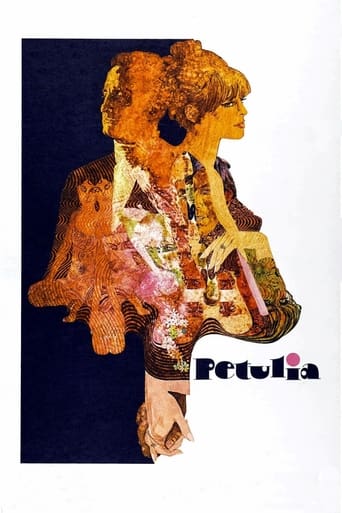

The 1960's were years of radical change, deliberate rebellion and outright discarding of many rules. This film called " Petulia " is one example of the deception of established but hidden lifestyles. It tells the story of Petulia Danner (Julie Christie) a young, fashionable, but very married woman with an extremely 'kookie' attitude to life. The inner burden she carries is difficult to reveal, so she masks it with a facade of erratic behavior. Among the various quirks she tries is attracting the attention of Archie Bollen (George C. Scott), a concerned doctor on the downside of a marriage. Interested, Bollen tries to understand Miss Danner, while adjusting his own life to the on-going divorce, the loss of his own kids and the knowledge that Patulia's jealous husband (Richard Chamberlain) is a rage-filled, physically abusive, spoiled rich man. Learning that Mr. Danner attacked and nearly killed his wife, Bollen must decided what to do with the on-going abuse. With a menagerie of 60's style rock bands and hippie, flower-child backgrounds, director Richard Lester, paints the movie with the addition of several cameo actors like Arthur Hill, Joseph Cotton, Howard Hesseman and Austin Pendleton. This is one film written by John Haase and Lawrence Marcos which well defines the sixties. ***
... View MoreThis film has an attitude, and the attitude is, "the director knows something you don't, and he's going to amuse himself by tossing riddles at an audience of common folk he's looking down his nose at." (This was typical of Lester's work. "We take acid, and we're cool. You don't, and you're stupid.")Lester tended to put style before both character and story, and that may be why his films haven't stood up for larger audiences.There actually =is= a story in this muddle, and it's not bad. Petulia herself provides the major clues near the beginning when she tells the good doctor that her mother was a prostitute and her sister was, too. In my line of work, the instant I hear revelations like that I start listening more carefully. Then we see that she's married a malignantly narcissistic sociopath. But the movie was 2/3's over before Joe Cotton's monologue in Petulia's hospital room gave the thing enough historical traction to make the foregoing and the remainder even remotely sensible. I read about a dozen other reviews here on IMDb and saw that most people see this the way most people saw "Mad Men" when it first hit cable three years ago. The vast majority of comments were about how faithful the show was to the early '60s as the viewers recalled it. But few could see what "Mad Men" was =about=, and unless one watches "Petulia" very carefully (and maybe even if they =do=), it may remain equally mysterious... if entrancing Lester has made the first three quarters of the film so hyper-artistic in the service of =his= sense of intrigue, that it will be a "long, strange trip" for most viewers. And in the world of a thousand cable TV channels, that usually means, "Where's my remote?" Orson Welles, Louis Malle, Federico Fellini and Michelangelo Antonioni had all used chronology-flipping. But in films like "Kane," as in AMC's "Mad Men," the technique works well because the characters are so compelling and the flashbacks are relatively self-evident. Here, however, the flashbacks are intentionally confusing, and the characters are way too murky until the final 20 minutes.There were people who bought into "Petulia" in the '60s because of their LSD and peyote trips. But a film about narcissistic sadomasochism among the unduly wealthy need not require a viewer's own masochism to make a point. And that point would be that "squares" like Scott's "Archie," who were socialized to common notions of "normality," will have a hard time understanding the "normality" of those outside their own mundane, middle class paradigm. I'm sorry, but I really sense a lot of Lester himself in Chamberlain's and Cotton's characters. A final word about the title character: The only people capable of forming obsessive attachments to sadistic narcissists are people who were raised to be masochistic with sadistic narcissists. And if they are as physically gifted as the beautiful, narcissistic-but-masochistic Petulia, they may become very compelling -- if frustrating -- attractions for those they seduce and mystify.I understand Petulia was meant (as a character) to be as devoid of humanity as her husband and his father. Even so, I didn't believe Petulia's "seduction" for ten seconds.
... View MoreJulie Christie parades her proletariat pout through 2 hours of psychedelic pretensions, all of which are seemingly supposed to suggest great profundity and hidden meaning--but don't be fooled--this is an empty parcel wrapped in glittering paper, with a core as resoundingly vacuous as the society it attempts to depict.The story, (such as it is) concerns a chic young woman (Miss Christie as "Petulia") who picks up children and middle aged men with casual indifference to convention, because she's "kooky" (recall that our anti-heroine here inherits this voguish characteristic from her cinematic sisters in "Georgy Girl," "Darling" and anything with Sandy Duncan). The reason for this, to which the story eventually arrives, but which it anticipates with frequent visual flashbacks, lies in an unhappy marriage with wealthy pretty boy Richard Chamberlin.In this instance, Petulia's latest adult male conquest is a recently divorced physician, (George C. Scott) with whom she commits adultery, between kooky capers (installing a greenhouse in a residential urban apartment, shopping out the store in an all night grocery etc.) and pronouncements such as "I think I've just found the cure for cancer".Amid the kookiness, and in order to assure us that this is all to be taken in deadly earnest, the story includes an incident in which Petulia is hospitalized after sustaining multiple lacerations in Mr. Scott's apartment. This sequence replete with ambulance runs, and much blood is designed to arouse sympathy for any in the audience who haven't yet warmed to our anti-heroine, who also turns out to be expecting a baby.Mr. Scott wears an expression throughout the film suggesting the worst case of indigestion in history, (and by the way it's the only expression he wears) and one wonders if his dissatisfaction is with the script or the character.In any case, he's unsympathetic, not the least of which is because his ex-wife is portrayed by the exquisitely lovely Shirley Knight of the golden blonde hair and guileless cornflower blue eyes. Her performance, so dead on target, saves the film, in at least those sequences in which she appears.Along the way, every visual cliché in the book is thrown in at some point including protesting hippies, daisy covered vans, strobe lit discotheques, and rock bands. The faddish choppy editing through which these scenes appear fleetingly is about as subtle as a sledge hammer.If the point of this cinematic charade is that modern society is filled with poseurs, then "Darling" from three years earlier made the same point much better. In this case, "Petulia" is the poseur par excellence.
... View MoreArchie Bollen(George C Scott, very good)is a square peg in a very circular world. He seems to be a Waldo amongst flower children. There's a scene I find humorous(..while others might find strange and/or pathetic)that shows Archie in the middle of a crowd of hipsters dancing in a psychedelic hall as some band was playing with weird-colored strobe lights flashing throughout. What makes this film so great is that he has no business having any connection whatsoever with "young-married" Petulia(Julie Christie). She has this feeling for him that spurns from an operation she watched him perform on a young Latino child named Oliver. Oliver, as the film would confirm later, is caught under a speeding car and it has everything to do with Petulia and her volatile, unpredictable, "quick-to-rush-into anger" husband David(Richard Chamberlain;he's unfortunately the unsung actor here because all the roles are so great that Chamberlain can be forgotten until his character changes Petulia's life through a horrible beating).Archie's previous married life to "Polo"(Shirley Knight who is outstanding as the conflicted wife;clearly, her work on here outshines everyone..even Christie in my opinion)wasn't a bad one, but something was missing. He felt suffocated, not to mention, there was no joy. When he can not get rid of Petulia, he succumbs to her charms and beauty. This film shows their unusual relationship, specifically how their differences bring them peculiarly closer because of this transfixing, overwhelming attraction that morphs into love.I have to say that Richard lester's direction just floored me. The way he edits the lifestyle of that period in San Francisco life and how he captures the people in that era..it's just Wow. I wish films like this were made today. It just vibrated off-screen to me and I was completely hooked to it's charms and visual fervor. The performances are already superb to begin with, but how Lester brings the past within the frame-work of the present..it's so fresh and innovative. This movie just wreaks of craftsmanship. A masterpiece.
... View More